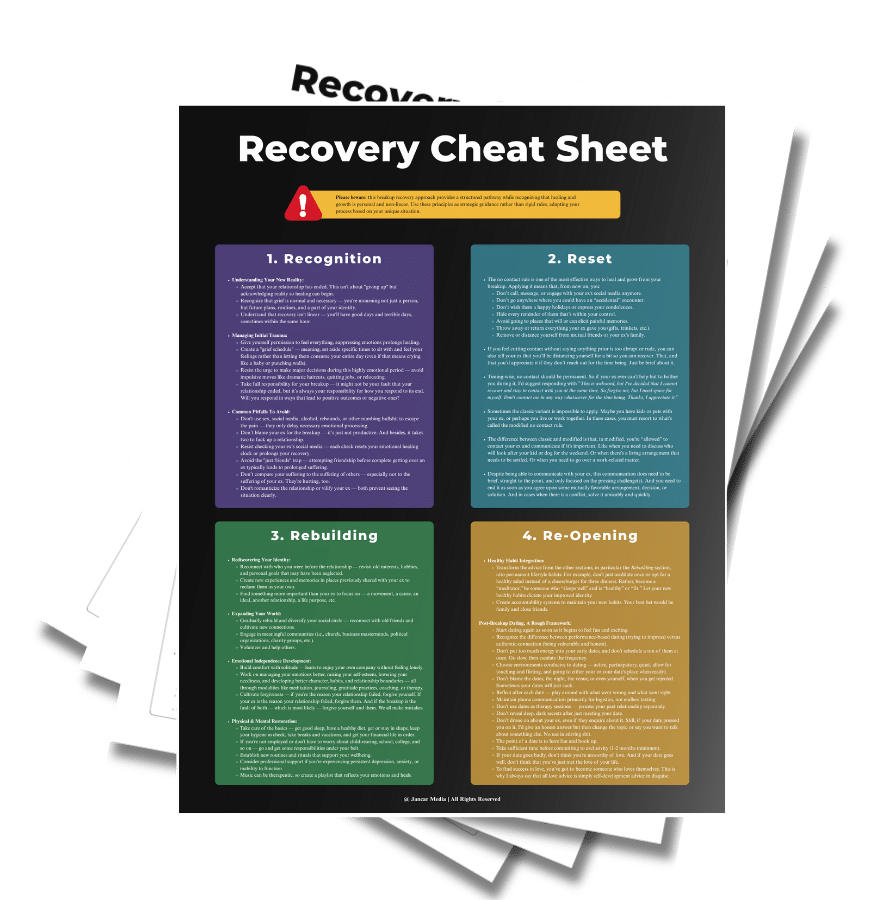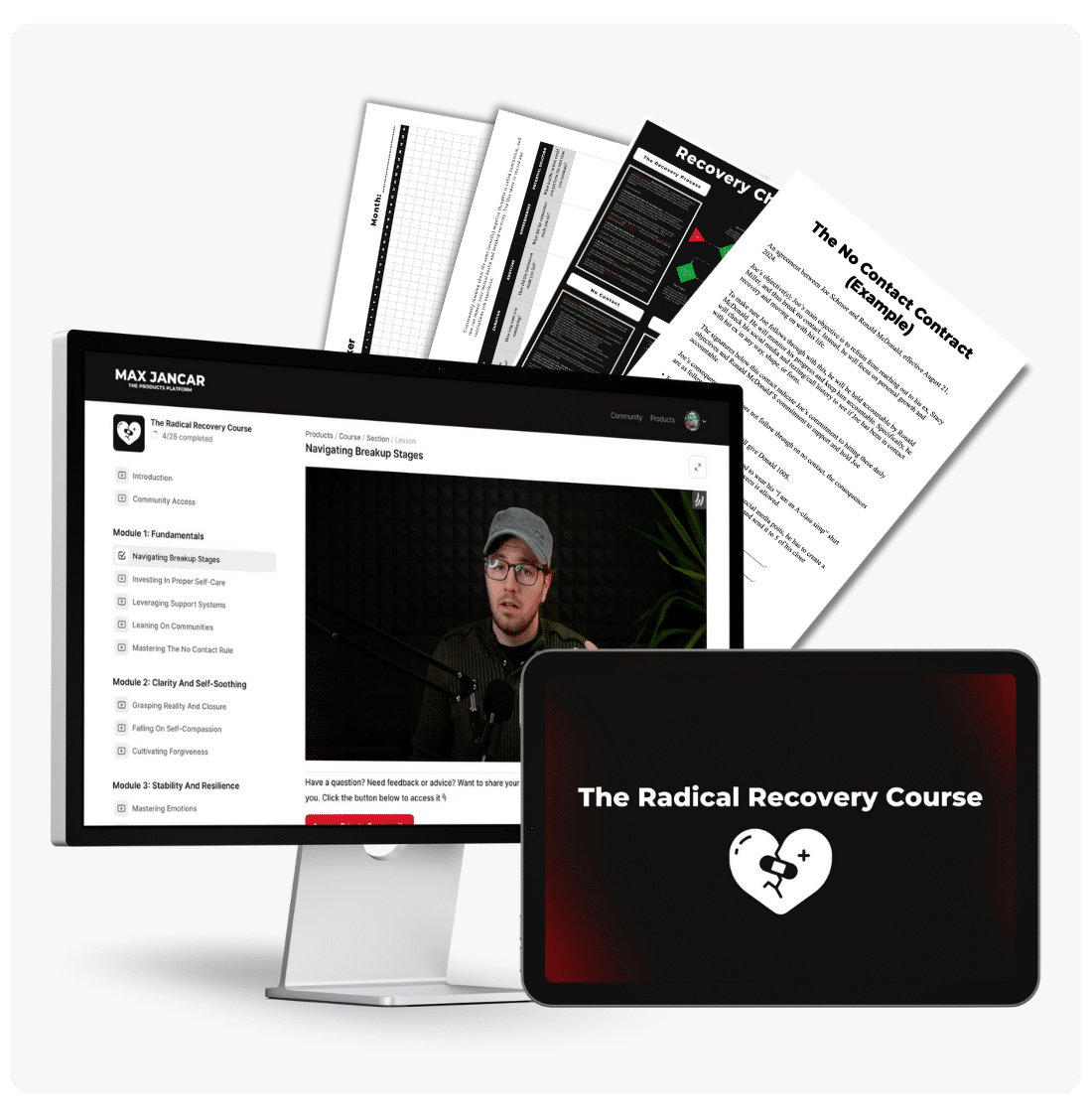Click play to listen to this article.
Lots of people become their worst enemy post-breakup.
They criticize themselves for not being the best partner they could’ve been. They belittle and judge themselves for not “moving on” fast enough and for being too shy, forgiving, emotional, or needy. They ruminate on past mistakes and isolate themselves, believing they are undeserving of love or companionship.
What’s worse, certain people begin to neglect their personal needs and self-care, often as a form of self-punishment or due to a lack of motivation caused by their emotional distress. Some even go on to indulge in self-harming behaviors, such as substance abuse or binge eating, as a means of numbing their emotional pain or gaining temporary relief.
Considering how many of us are conditioned to be “tough” on ourselves to get through hardships like a breakup, the popularity of these dysfunctional behavioral patterns doesn’t surprise me.
Enter self-love.
Self-love is the antidote to all the toxic behaviors I listed till now. But it doesn’t stop there. Cultivating it improves virtually every area of your life: relationships, sleep, health, diet, self-esteem and awareness, psychological resilience, and more. (1) (2) (3)
While there are many ways to explain self-love, at its core, it really boils down to one simple idea: treating yourself with kindness, compassion, and understanding — kind of like how you’d treat a best friend.
A guide to breakup recovery based on embracing discomfort, extracting wisdom from dark moments, and healing through evidence-based practices.
Order Your CopyAddressing The Reservations
Guides on self-love usually make people squirm. Some believe the concept is some gay-ass hippie idea with no scientific grounding. Some believe it’s a one-way ticket to self-absorption and narcissism. Others believe it consists of nothing but vacuous phrases riddled with other placebo nonsense that makes one feel better only superficially.
In reality, self-love is none of that.
Self-love has a solid base of empirical research behind it, excluding it from being just some gibberish. It also doesn’t lead to self-absorption and narcissism — it leads away from them. And it’s far from an accumulation of empty phrases. It’s a whole branch of psychology, a whole science. (4)
Another crooked belief people have about self-love is that it’s a trait you’re born with — a trait that’s either there or it’s not. This is also complete bullshit. Your capacity for self-love is not a predefined trait. It’s a skill you can learn and get better at — just like playing chess or learning an instrument.
So in the name of learning and getting better at self-love, here are a few practical, no-bullshit activities to try out.
[offer]
How To Love Yourself After A Breakup
Some of the activities below are based on the work of Neff Kristin and Brene Brown. They’re also listed in no specific order. And the list is far from exhaustive — these are the only ways of loving oneself that I’ve seen work best first-hand.
Activity #1: Learn To Befriend Your Inner Critic
Grab some writing utensils and settle down somewhere you won’t be disturbed. We’ll do some writing. That said, you can also perform the following by talking to yourself if you prefer.
Step one would be to simply notice your inner critic. When you catch him at work, reflect on what he’s telling you. Try to be as accurate as possible, noting the inner speech verbatim. Get a clear sense of how you talk to yourself. Note down everything. You want to fully understand your inner critic.
Once you notice him, move on to step two, softening your inner critic’s voice. Be sure you do this through self-love rather than self-judgment. For example, instead of telling your inner critic, “You’re such a bitch, leave me alone,” say something like, “I know you’re trying to keep me safe and point out ways I can improve, but your criticism is not helping at all. It’s only causing me unnecessary pain. So stop it.”
Finally, step three would be reframing your inner critic’s observations. Basically, imagine what a loving and compassionate friend would say to you in your situation. You can tell yourself something like, “This breakup has nothing to do with your worth as a person. It doesn’t lower it, diminish it, or bury it; it doesn’t affect it at all. You’re okay. Maybe you just made a few mistakes as everyone else does.”
Activity #2: Turn Negative And Positive Self-Talk More Realistic
Contrary to what many people believe, irrationally positive self-talk is just as harmful and stupid as the irrationally negative. Telling yourself you’re a failure because you got dumped is just as bad as telling yourself how you didn’t make any mistakes in your relationship and that your breakup is solely your ex’s fault.
In both cases, you’re deluding yourself about your situation. The reality, however, is that all the nasty and horrible things you say to yourself about yourself are untrue. And all the amazing and badass things you say to yourself about yourself are probably untrue as well.
Since positive self-talk is off the table, and staying in the negative is just as destructive, the only healthy thing left to do is to cultivate realistic self-talk. This is the solution you want to gravitate to — this is what will actually lead to a sustainable and robust stream of self-love.
So the next time you tell yourself, for example, that you’re a failure for getting dumped — similarly to what I wrote in activity #1 — reframe that into something like, “No, I’m not a failure; I just made a mistake. I should be kinder to myself. We all fuckup sometimes, after all.”
Or when you tell yourself you’re actually a badass and your ex is dumb for not seeing your amazing potential and breaking up with you — reframe that into something like, “I’m clearly overcompensating here. I’m not a badass, I’m just a normal, average guy/gal trying to figure out relationships. And I shouldn’t irrationally pump myself up and look down at my ex just to cope with my shattered self-esteem.”
Activity #3: See How Ordinary And Boring Your Breakup Really Is
Thinking that your breakup is abnormal only alienates you from everyone else and makes you feel special. It’s a subtle form of entitlement.
But truth is, virtually everyone has gone through a breakup, and most people have it way worse than you. This is a tough pill to swallow for some, but your breakup really is nothing special.
Once you realize this, and convince yourself that it’s true, you’ll find that loving yourself becomes far easier.
To achieve this realization, talk with other breakup survivors. That said, if none of the people you know are currently heartbroken, don’t worry. Thanks to the Internet, there are many online breakup recovery groups you can join where people from all walks of life discuss their heartbreak and help each other out.
Another thing you can try is to volunteer. That should get your struggles into perspective. Perhaps join the help crew at a homeless shelter or spend time in a cancer ward.
There, you’ll find suffering much worse than yours, making you realize you’re actually doing pretty well. Hence, loving yourself after your breakup will become easier.
Activity #4: Acknowledge And Validate Your Pain
Your breakup pain can’t physically hurt you. But if you constantly run away from or try to suppress it, you train your brain to believe it can. As a result, you feel more fear, anxiety, anger, and shame. And because of these negative emotions, loving yourself becomes harder.
But by acknowledging and validating your pain, you can short-circuit this process and accelerate the expansion of self-love. Let’s unpack this idea.
Acknowledgment means avoiding unhealthy and chronic distractions while in pain and addressing that pain by admitting to yourself that you feel like shit, at least at the moment.
This may sound simple on the surface, but it works. And even if the acknowledgment doesn’t give you immediate relief, it still does something way more powerful: it trains your brain not to fear painful emotions.
After you acknowledge your pain, remind yourself that it’s okay to feel it — that’s what it means to validate it.
Think of validation as a pressure-release valve on pain. By validating it, it grows less powerful and intense. Sometimes it even fades entirely, at which point, as you’d expect, loving yourself becomes easier.
Activity #5: Get Some Space
For one, cut your ex out of your life and don’t communicate with them anymore. Or at least distance yourself from them if you still need to stay in touch for logistical reasons like having kids or pets or because you work or live together.
(This is technically called “going no contact,” which you can read more about here).
Once you have distanced yourself from your ex, book a trip for yourself for the next few weeks — at least two. On this trip, focus on the following:
- Reconnection: reconnect with who you are, what you care about, and what you stand for — your identity.
- Clarity: work on getting stillness and peace of mind despite the breakup.
- Enjoyment: relax and indulge in what you love or think you’d love to do.
This trip is essentially your time to be selfish. To really amp up self-love during it, play around with mindfulness, reflection, meditation, journaling, gratitude practices, qi-gong, and yoga.
Activity #6: Keep a Gratitude Journal
People who have trouble loving themselves after a breakup tend to have a negativity bias when it comes to themselves. They dismiss their successes and strengths and overly obsess over their shortcomings and flaws.
An easy way to begin to correct this negativity bias is to keep a gratitude journal. In a nutshell, take a few minutes each day to reflect on one or two things about yourself that you’re grateful for and write them down. It helps to be as specific as possible.
A few examples:
- I’m grateful my best friend, Jane, is willing to put up with my venting whenever I have a crisis about my breakup.
- I’m grateful I have enough money to go on a relaxing trip to Thailand to get my mind off my ex.
- I’m grateful I stood up for myself when my ex called me in the middle of the night for a meaningless hookup.
One last thing: keep this practice simple. Simple = sustainable. And sustainability is key! Much better to spend one minute every day writing in your gratitude journal than spending an hour one day, then putting it off repeatedly because it feels too burdensome.
Activity #7: Forgive Yourself
Forgiving yourself can be challenging, but it’s an essential step to self-love.
Start by acknowledging what you did wrong in your relationship, considering how your actions affected your ex. You can also think about what you could’ve done differently in your relationship and how you could have prevented the breakup.
Then take responsibility for those fuckups. Don’t blame your ex, your family, their friends, the mailman. I don’t care whose to blame — as long as you own up to your fuckups, you’ll be fine.
Next, turn to self-compassion. Basically, realize that you’re human and you will make mistakes, like all of us. And that there’s nothing really wrong about that as long as you’re learning and growing from them.
Finally, Instead of dwelling in the past, focus on the present moment for a change. Set new goals for yourself, create new healthy habits and routines while breaking the bad ones, and take steps towards building an ideal future for yourself.
Remember that forgiving yourself is a process, and it may take time. Be patient with yourself and seek support from friends, family, or a mental health professional if needed.
An online interactive video course that teaches you how to get past a breakup so you can create a new possibility for love (with your ex or someone new).
Get Instant AccessAlways Mind Intentions
Regardless of how you approach self-love, there’s one thing you should always keep in mind: doing it for the right reasons.
If you’re doing any of the activities from this article because of outside influences — like a friend, family member, or me telling you to do them — then that’s not true self-love. At least not an effective form of it.
But if you’re doing these sorts of activities because you want to do them — because you believe in them and that they will help you — then you’re doing self-love the right way.
Love yourself the right way.
This cheat sheet lays out 40+ solutions to overcoming a breakup so you can create a new opportunity for love — be that with your ex or someone completely different.
Get The Free Cheat Sheet


